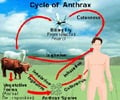A British drum-maker has died of a rare form of anthrax he contracted from the spores on animal skins he was using.
A British drum-maker has died of a rare form of anthrax he contracted from the spores on animal skins he was using. He was only the fourth person to die from inhaling the bacteria for more than a century in Britain, an inquest heard.
Fernando Gomez, a folk musician of Hackney, East London, used animal skins - particularly those imported from Africa - to make bongos. He had been living in the UK for around seven years after moving from Madrid, Spain.The inquest heard two animal skins found at his studio flat were contaminated with very similar anthrax spores as those found in his blood. But health chiefs had been unable to establish where the skins had come from.
Mr Gomez, only 34, died in November 10 days after checking into Homerton Hospital with breathing difficulties, a loss of appetite and night sweats.
He died when toxins released by the Anthrax bacteria caused multiple organ failure.
Special medicines had been flown in from America because the disease was so rare and he was put on the same course of antibiotics as ''those exposed to Anthrax in the US terror attack in 2001.''
Coroner Dr Andrew Reid recorded a verdict that he had died of natural causes with the cause of death being ''sepsis and toxemia due to inhalation anthrax'', adding: ''It is not for me to determine any issue of criminal or civil liability.''
Advertisement
She told the hearing: ''He made drums. He had last bought skins in around April or March last year and used the last one around 5 October.''
Advertisement
Dr Tim Brooks, of the Health Protection Agency, told the inquest: ''The evidence suggests that we discovered two skins in Mr Gomez's house which were contaminated with spores of Anthrax and they would appear to be very similar to the ones isolated from the blood.
''The assumption would be that in handling the skins he applied sufficient energy to put them [the spores] into the atmosphere and then he was unlucky enough to breath in that air that had been released.''
The inquest heard that inhaling anthrax was by far the rarest way of contracting the disease, with infection more common through the skin or by contaminated materials.
Dr Brooks told the hearing inhalation of anthrax was ''exceptionally rare'' and this was only the fourth case recorded in the UK since 1904, while another expert said there were only six known cases of musicians becoming infected in the world.
Inhaling the bacteria is also the most deadly cause, with Dr Edward Krahe, a consultant microbiologist at the Homerton Hospital who treated Mr Gomez, saying that once a patient presents with symptoms there is a 100 per cent mortality rate.
The inquest heard that there are two ways of safely importing animal skins into the UK - either they come from a country whose disease controls are approved by the European Commission or they are chemically processed and tanned.
Seneke Silah, a friend of Mr Gomez, told the hearing in he had supplied the Spaniard with three goat skins he brought back into the UK from Gambia in June or July last year.
Gambia is not approved by the EC, but there was no evidence linking the batch he brought in with the two contaminated skins. Tests on skins from Mr Silah's batch showed none contaminated.
Mr Silah said they were three of 40 he had brought back following a trip in April. He said: ''I have got no idea whether they had been treated.''
However, the inquest heard that there were five skins found in the flat after Mr Gomez died and though Mr Silah was his main supplier friends had said Mr Gomez had prepared skins and drums for people who dropped skins off, Telegraph reported.
Dr Sudy Anaraki, a consultant in communicable disease control, said the two infected skins could not be ''linked directly'' to the batch brought from Gambia.
She added: ''We couldn't attribute the two infected skins to any particular supplier. We couldn't identify the source of these skins.''
Source-Medindia
GPL/SK







